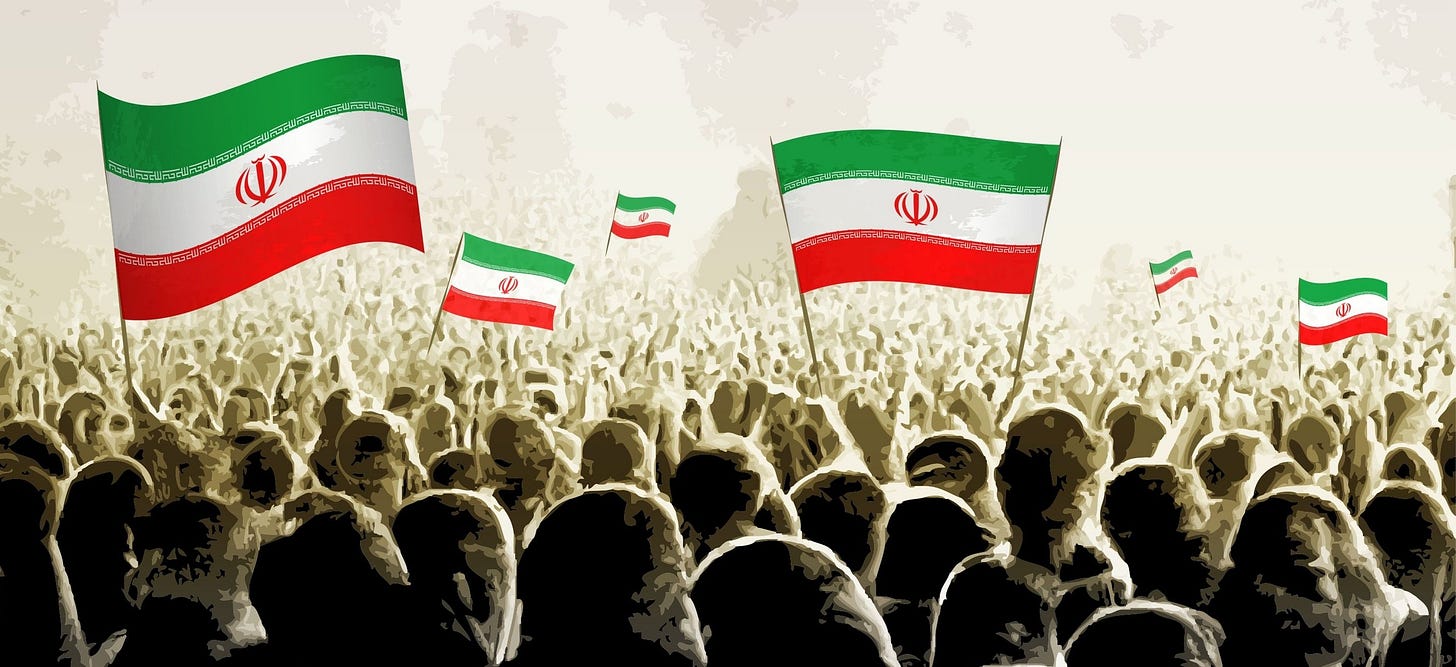E-Pluribus | November 22, 2022
The new century's new Right; Iran's protests and the future of democracy; and What is a Woman and the future of journalism.
A round-up of the latest and best writing and musings on the rise of illiberalism in the public discourse:
Christopher DeMuth: America’s Right Confronts the 21st Century
Both the Left and Right periodically reevaluate the focus, direction and strategies of their respective ideologies. While the right’s introspection predates Donald Trump, there’s little doubt his appearance on the scene has sparked a great deal of debate. In The Wall Street Journal, Christopher DeMuth explores the American Right in the 21st century.
Our evolved nation may be less lovely and pristine than the one we imagine the Founders bequeathed to us, but it is the only one we have to work with today. Recognizing this is essential to the unromantic situational awareness of practical conservatism. Here are two examples:
First, if our nation hadn’t fought and won the Civil War and enacted the 13th, 14th and 15th amendments, the equality principles of the Declaration, sanctified at Gettysburg, wouldn’t be central to our national self-conception and political institutions in 2022. Political and legal equality was realized through a terrible war, hundreds of incremental, political, legislative and judicial decisions and changes in social conventions.
If equality is an abstract philosophical imperative, a good in and of itself, then its boundaries are bursting and subject to never-ending expansion. That is how it is used nowadays to justify equal rights for illegal immigrants, racial preferences and the Biden administration’s equity programs favoring a long and elastic list of politically selected identity groups, including its catch-all category of those “adversely affected by inequality.” In responding to these initiatives, we have much more to go on than the thrilling poetry of the Declaration. We have 150 years of prosaic experience calibrating the dimensions and boundaries of equality in a multitude of circumstances and learning from the results. That gives us the means, and ought to give us the confidence, to accept some contemporary claims and reject others.
Second, today’s administrative state is much more than the outgrowth of Woodrow Wilson progressivism, which proposed to replace James Madison’s fussy separation of powers with efficient, expert government. It is the product of late-20th-century affluence, mass media and expanded political participation, which generated profuse new demands for government action on behalf of personal health, safety and dignity, the natural environment and much else. These were more than a representative legislature could manage, and Congress turned them over to specialized bureaucracies—with their thoroughly modern fusion of lawmaking, surveillance and enforcement. Debunking Wilson and reviving Madison may be necessary to taming this monster, but it isn’t remotely sufficient. We need to devise forms of representative lawmaking, due process and federalism suitable to today’s circumstances—a big assignment even if we win the intellectual arguments.
Read the whole thing.
Reuel Marc Gerecht: Iran, America, and the Democratic Impulse
The current unrest in Iran is not the first time speculation has run high about possible changes in the Middle East (remember the “Arab Spring”?), but Reuel Marc Gerecht at The Dispatch looks at how America and other Western countries have tried to foster democracy in the Middle East and around the world and whether the current situation might provide yet another opportunity for democracy to take root where it has often withered before.
American political and intellectual elites remain uneasy with democracy promotion everywhere primarily because it has failed so far in the Middle East, the epicenter of our attention the last 20 years. (Iraq’s democracy isn’t dead, but it didn’t meet American expectations.) Might our dictatorial exception for Middle Eastern Muslims change if Iran were to set in motion insurrections elsewhere in the Islamic world, in much the same way that America’s response to 9/11 probably helped to produce the rebellions against dictatorship that started in Tunisia in 2010? The failure of the so-called Arab Spring to establish one functioning democracy, the retreat of secular democracy in Turkey, and the implosion of large parts of the Arab world have left many wondering whether Middle Eastern Muslims can sustain representative government.
Because of the Abraham Accords, now embraced by the Democratic Party however reluctantly, both parties are aligning U.S. support for Israel with monarchies in the region. Washington has essentially returned to a pre-1979 mentality: Kings, princes, and one president-for-life—Egypt’s Abdel Fattah el-Sisi—define our approach to Arabs.
[ . . . ]
The Iranian people will first have to pull off a small miracle by downing their overlords. It’s hard to imagine a peaceful end to the theocracy for the simple reason that most of the regime’s security apparatus may not be able to conceive of themselves in a new state. Ayatollah Ruhollah Khomeini and his minions encouraged defectors from the shah’s military by suggesting they could have a place in the new order; most were later imprisoned, killed, or driven into exile. Ever since the crushing of the pro-democracy Green Movement in 2009, Ali Khamenei, Khomeini’s successor, has been cleaning house in the Islamic Revolutionary Guards, probably to ensure that higher ranks have the necessary unflinching temperament. The supreme leader’s selection of Ebrahim Raisi as president was likely part of the same process. Many political and clerical VIPs are increasingly trying to distance themselves from the current crackdown, but enough of these men would probably fight hard for the status quo, making a revolution bloody. When both sides radicalize, birthing a successful democracy becomes harder.
[ . . . ]
Historically, Americans have often been able to root for and support the export of democracy in one place and ignore the democratic aspirations of peoples elsewhere. Especially in the Middle East. A functioning democratic Iran would, nonetheless, likely have a significant magnetic effect upon American deliberations. It’s one thing to espouse and defend popular sovereignty in Taiwan while effectively denigrating its practice in Saudi Arabia, Egypt, and the Republic of Azerbaijan, and another to do the latter while a democratic Iran obliges us to rethink the cultural and religious assumptions behind blinking at Muslim police states.
Read it all.
Matt Lamb: Student journalists demand college cancel ‘What is a Woman’ event
Journalists are supposed to be curious, but a group of student journalists at Central Connecticut State University decided that “What is a Woman?” is a question that needn’t be explored. A showing of The Daily Wire documentary by that name was opposed by a number of groups at the school, including the one that is supposed to be preparing its members to be on the First Amendment front lines, reports Matt Lamb for The College Fix.
Student journalists at Central Connecticut State University took on an activist role recently and demanded that administrators cancel a documentary showing and closely monitor the Turning Point USA chapter.
The Society of Professional Journalists chapter on campus signed onto a letter from the Pride Club that demanded cancellation of Walsh’s movie, “What is a Woman.” The Daily Wire documentary includes interviews with professors, transgender advocates and skeptics of the chemical and genital mutilation of people to answer the question “what is a woman?” He is not speaking on campus.
The letter, discovered by Campus Reform, stated: “First and foremost, this event cannot be allowed to take place on campus. This campus should be a safe place for all students. The event occurring on Thursday would undoubtedly be an active safety concern for any trans student who entered Devil’s Den at the time of showing, and would spark persistent harm in the form of discriminatory disinformation towards multiple communities of marginalized students.”
Read it all here.
Around Twitter
Peter Boghossian on what at least some of the opposition to Elon Musk’s Twitter is about:
Zaid Jilani highlights a Los Angeles Times op-ed that is a study in caricaturing one’s opponents:
And finally, perhaps the best way to avoid arguing around the Thanksgiving dinner table is to… not argue. But if you insist, Erica Pandey has some suggestions. Happy Thanksgiving!









